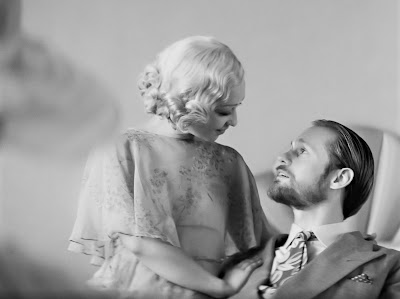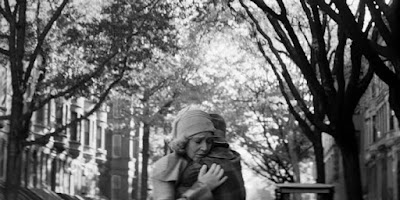For a debut feature film, the decision to adapt Nella Larsen's 1929 novel 'Passing' is an incredibly ambitious one by Rebecca Hall.
The novel is not widely known to most cinemagoers and while it was well received initially when it was first published, it got very little traction outside of New York.
Over the years, academics have hailed Larsen as a key figure in African American, feminist and modernist writing.
However some have tended to view her debut novel 'Quicksand' as a more impressive work.
Hall's movie of 'Passing' may finally bring Larsen's novel to wider attention.
However it too is a venture that does not seem tailored for the mainstream.
Shot in monochrome on a 4:3 aspect ratio for an extremely modest budget of $10 million without any major household names, it has taken the actor 10 years to bring her film addressing race to the big screen.
But boy, has it been worth the wait.
Tessa Thompson is Irene Redfield, a lighter skinned African American woman married to André Holland's Harlem doctor, Brian.
She has two sons and a housekeeper, Ashley Ware Jenkins' Zu who tends to the family's needs.
At the start of the film, Irene is wandering through Manhattan uwhen she decides to go to a hotel for refreshment.
Sitting in the hotel, she watches the arrival of a woman and her wealthy husband.
He leaves his wife to go off on business and when the woman approaches Irene and appears to recognise her she doesn't realise it is a childhood acquaintance.
This is because Ruth Negga's Clare Bellew, who sports a blonde hairdo, is passing herself off as a white woman.
Identifying Irene by her childhood name of "Reenie," Clare is excited to see her and invites her back to her hotel room to drink ice tea in champagne flutes.
Clare is married to Alexander Skarsgard's Chicago businessman John Bellew who is unaware that she is an African American.
She is enjoying the life of a socialite, with a child in boarding school in Switzerland.
When John arrives and is introduced to Irene, he seems unaware that she is also an African American passing as a Caucasian woman.
During the conversation, he makes disparaging remarks about African Americans and baldly tells Irene he hates them, as does Clare.
Rattled by the venom of his comments and by Clare's repudiation of her race, Irene makes her excuses and leaves.
Returning home, she tells Brian about her encounter and that Clare is passing herself off as a white woman in Chicago high society.
As she and her husband contemplate a move to New York, Clare writes to Irene in the hope of building a friendship.
Initially on Brian's advice, Irene ignores the correspondence.
However Clare one day turns up at her door - eager to understand why Irene has not responded to her overtures.
Irene eventually relents.
Introduced to Irene's two sons and then Brian, Clare starts to become a regular fixture in their lives - secretly visiting them in Harlem, hanging around the house and going to jazz clubs with the couple.
Clare's visits to the Redfields offer her a chance to embrace her background which she has chosen to suppress by passing herself off as a white woman
She charms everyone she engages with from Zu to Brian and the boys and Bill Camp's writer Hugh Wentworth - a white friend of Irene's who often joins them on nights out.
However Clare's flirty nature and Brian's warming towards her begins to plant seeds in Irene's head that her husband might be having an affair.
Will the women clash over Clare's increasingly close bond with Brian?
Will Brian and Irene's marriage fall apart?
And will Clare's secret that she is passing herself off as a white woman ever be exposed?
'Passing' is an extremely clever directorial debut from Hall who shows a real flair for visual storytelling.
With the help of some superb black and white cinematography by the Spaniard, Eduard Grau and some astute editing by Sabine Hoffman, Hall recreates a 1920s world where it is possible to believe that African American women with a lighter skin tone could convincince white socialites they are white themselves.
Hall first read Larsen's novel 13 years ago but has also drawn from her own family background.
The Londoner discovered that her own mother, the opera singer Maria Ewing was biracial and that her maternal grandfather was a light skinned African American who often passed himself off as white in Detroit in the 1930s, 40s and 50s.
Adapting the novel, Hall has been pretty faithful to Larsen's tale - only tinkering with a few details and has crafted a subtle screenplay that toys with our emotions towards Clare and our revulsion at a society that forces her to suppress her racial background to access the upper echelons of society.
As you would expect from an actor of Hall's calibre, she is very good as a director at drawing out strong performances from her cast.
Negga is terrifically flighty as Clare and it is easy to see how through sheer force of personality she could mesmerise those around her.
There"s a touch of Blanche DuBois from 'A Streetcar Named Desire' about Negga's performance.
Holland is excellent as Irene's husband, who prides himself in keeping it real when raising his sons - reading newspaper reports about a lynching in Little Rock.
And yet, Brian quickly succumbs to Clare's charms after being initially wary of her.
Camp is as impressive as ever as a writer who enjoys the company of Irene and is prone to making the occasional caustic comment.
Skarsgard has the unenviable task of playing Clare's racist husband but really steps up to the plate.
There are decent turns too from Ware Jenkins and also Antoinette Crowe-Legacy as Irene's friend Felise.
The film, however, belongs to Tessa Thompson as Irene who turns in a tremendously controlled performance of considerable subtlety and skill.
Great movie acting is not just about how you deliver dialogue.
It's about how actors use their body language and particularly their eyes to convey emotion when their characters are not speaking.
Thompson's performance is a masterclass in how to let the eyes do the talking and it will be a terrible snub if she is overlooked on the acting shortlists during awards season.
In the much showier part, Negga makes a strong case too for awards consideration.
By diving into the thorny territory of race, it is easy to see how Hall could end up with a film that underwhelms or even backfires.
However through her subtle and gentle approach to visual storytelling, she deftly draws out questions not just about the phenomenon of passing and what it said about racism in the US but also about class and marital politics.
'Passing' is one of those films that will have you ruminating on it for days.
That's quite an impression to make with your first feature.
Hopefully, 'Passing' isn't a one-off venture for Hall because there is plenty in here to suggest she could forge an equally impressive career behind the camera.
('Passing' was released in UK and Irish cinemas on October 29, 2011 and was made available for streaming on Netflix on November 10, 2021)














Comments
Post a Comment